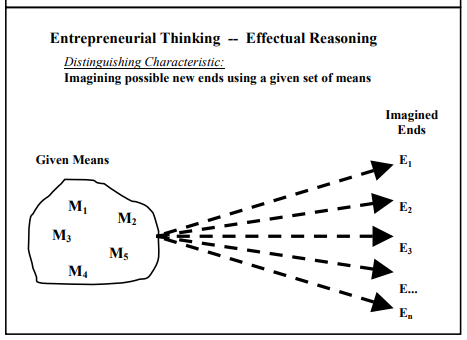What makes entrepreneurs entrepreneurial?
Saras D. Sarasvathy of the University of Virginia
I came across Saras Sarasvathy’s study/article/piece…by chance while visiting Vinod Khosla’s website. I found his commentary to this piece of text here. In it, you can tell he related to much of what the author said, so I read it and left my comments below. Cheers!
“Is there such a thing as “entrepreneurial thinking” that can be applied across space, time and technology?”
I wonder how this type of thinking can be applied across industries, companies – both new and established, and within projects.

“While both causal and effectual reasoning call for domain-specific skills and training, effectual reasoning demands something more – imagination, spontaneity, risk-taking, and salesmanship.”
I love this part where Sarasvathy describes the difference between causal and effective (entrepreneurial) reasoning with an example of a chef in two different kitchens and asks. There is beauty in the imagination of not knowing the end result with what is provided (which they refer to as “given means”). As I used to say to my physics student, the givens to the problem, the operating conditions to which we solve our problems are the basis to what to do next.
All entrepreneurs begin with three categories:
(1) Who they are – their traits, tastes and abilities;
(2) What they know – their education, training, expertise, and experience; and,
(3) Whom they know – their social and professional networks.
This is a section of the paper that stood out to me. I found this section first, as I quickly scanned the document gauging whether it was worth reading. Effectual thinking and logic is viewed through a lens of who I am, what I knew, who I know.
Several of the expert entrepreneurs I studied insisted that they would
not do any traditional market research, but would take the product to the nearest possible potential customer even before it was built.To quote but one of them, “I think I’d start by just…going…instead of asking all the questions I’d go and say.. try and make some sale. I’d make some… just judgments about where I was going — get me and my buddies — or I would go out and start selling.
I’d learn a lot you know…which people…what were the obstacles.. what were the questions.. which prices work better and just DO it. Just try to take it out and sell it.
Even before I have the machine.
I’d just go try to sell it.
Even before I started production.
So my market research would actually be hands on actual selling. Hard work, but I think much better than trying to do market research”
It is not the first time hearing about selling the idea of the MVP, not even the MVP itself. Merely putting the idea in front of people. Let’s be honest, I think many people including myself believe doing so will lead to your ideas being copied/stolen. “You need an NDA to put ideas in front of people.” Wow, imagine having an internet audience sign NDA’s to validate the idea.
It’s a gatekeeping strategy for many situations. Some situations I can of course understand the need for protecting your intellectual property.
As one of the subjects in the study put it,
“I always live by the motto of Ready-fire-aim.
I think if you spend too much time doing ready aim-aim-aim-aim, you’re never gonna see all the good things that would happen if you actually start doing it and then aim.
And find out where your target is.”
What an incredible analogy for analysis paralysis that some inexperienced entrepreneurs have. I have it at times. I think I resonate more with the latter. Finding your target, getting clear on what the target is, is essential. (Link to Tsai City problem identification workshop…)
“To the extent that we can control the future, we do not need to predict it.“
This, as Sarasvathy puts it, is the effectual reasoning model. This is the way the entrepreneur thinks and sees the world. The assertion is that the entrepreneur controls the future with their visionary and action-based attitude, therefore predicting and hoping for a future is not necessary.
This is in contrast with the alternative causal logic, “To the extent that we can predict the future, we can control it.” To me this is a very passive perspective on the future and one that depends entirely on speculation.
Sarasvathy then goes on to define different futures. After all, how we interpret this belief depends on our definition and understanding of what future means [to us as entrepreneurs]. They provide an example of two scenarios with different urns and colored balls.
In fact, the simplest way we can model the different types of uncertainties is through the classic statistical model of the future as an urn containing different colored balls wherein the drawing of (say) a red ball, results in a reward (of say, $50). Assume the first urn contains 10
red balls and 10 green balls. In this case, the player can calculate the odds as an expected return of $25 on every draw since there is a 50-
50 chance of winning $50. This is the model of a risky, but predictable, future.Versus:
Whatever the initial distribution of balls in the urn, I will continue to
acquire red balls and put them in the urn. I will look for other people who own red balls and induce them to become partners and add to the red balls in the urn. As time goes by, there will be so many red balls in the urn that almost ever draw will obtain one. On the other hand, if I and my acquaintances have only green balls, we will put them in the urn, and when there are enough, will create a new game where green balls win.
“But entrepreneurs choose to view the future through effectual logic. Consciously, or unconsciously, they act as if they believe that the future is not “out there” to be discovered, but that it gets created through the very strategies of the players.“
I prefer to view a future that is created, rather than speculated. In my case, I prefer a co-created future that is imagined by a collection of visionaries; call them entrepreneurs or effectual thinkers.
We also get to hear about the beginnings of the U-Haul moving and storage company. U-Haul was my first job…funny. Thank you Leonard Shoen for creating my first job opportunity, almost a century earlier. Shoen started with $5000 and effectual logic and courage which helped not only propel his venture forward, but also distribute the risk among many stakeholders.
Effectual reasoning may not necessarily increase the probability of success of new enterprises, but it reduces the costs of failure by enabling the failure to occur earlier and at lower levels of investment.
Overall, I thought Sarasvathy’s answering of the question, What makes entrepreneurs entrepreneurial?, a good analysis of the psychology of an entrepreneur. Many successful founder talk about the effectual logic model but do not describe it with such terms, which is why I found a lot of value in reading this piece of text. Instead, I hear the term get diluted to visionary problem-solver or some variation, which essentially describes all business founders and leaders.
It was a good read.

